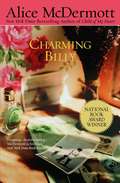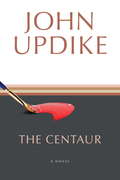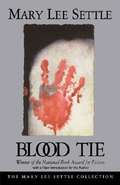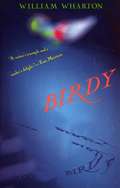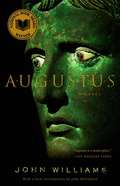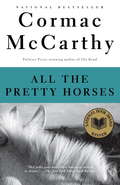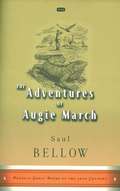Special Collections
National Book Award Winners - Fiction
- Table View
- List View
Charming Billy
by Alice McdermottBilly Lynch's family and friends have gathered at a small Bronx bar. They have come to comfort his widow and to eulogize one of the last great romantics, trading tales of his famous humor, immense charm, and unfathomable sorrow. As they linger on into this extraordinary night, their voices form Billy's tragic story and their mourning becomes a gentle homage to all the lives in their small community fractured by grief, shattered by secrets, and sustained by the simple dream of love.
National Book Award Winner.
The Centaur
by John UpdikeWINNER OF THE NATIONAL BOOK AWARD AND THE PRIX DU MEILLEUR LIVRE ÉTRANGER The Centaur is a modern retelling of the legend of Chiron, the noblest and wisest of the centaurs, who, painfully wounded yet unable to die, gave up his immortality on behalf of Prometheus. In the retelling, Olympus becomes small-town Olinger High School; Chiron is George Caldwell, a science teacher there; and Prometheus is Caldwell's fifteen-year-old son, Peter. Brilliantly conflating the author's remembered past with tales from Greek mythology, John Updike translates Chiron's agonized search for relief into the incidents and accidents of three winter days spent in rural Pennsylvania in 1947. The result, said the judges of the National Book Award, is "a courageous and brilliant account of a conflict in gifts between an inarticulate American father and his highly articulate son."
Blood Tie
by Mary Lee SettleThe story tells the political, social, psychological and anthropological aspects of American and European expatriates who took refugee in an ancient Turkish city.
Winner of the 1978 National Book Award.
Birdie
by William WhartonAn amazement. . . a combination of flashback and interior monologue that Freud and Joyce would both be proud of. . . [Birdy] is a philosophical romance of the highest order. It gleams with remembered youth, and desire, and the emancipating dream. It is at home with the irrational. . . an enchanting book.
Winner of the National Book Award
Augustus
by John A. WilliamsA brilliant and beautifully written novel in the tradition of Robert Graves’ I, Claudius, Augustus is a sweeping narrative that brings vividly to life a compelling cast of historical figures through their letters, dispatches, and memoirs.
A mere eighteen years of age when his uncle, Julius Caesar, is murdered, Octavius Caesar prematurely inherits rule of the Roman Republic. Surrounded by men who are jockeying for power–Cicero, Brutus, Cassius, and Mark Antony–young Octavius must work against the powerful Roman political machinations to claim his destiny as first Roman emperor. Sprung from meticulous research and the pen of a true poet, Augustus tells the story of one man’s dream to liberate a corrupt Rome from the fancy of the capriciously crooked and the wildly wealthy.
Winner of the National Book Award
All the Pretty Horses
by Cormac MccarthyThe national bestseller and the first volume in Cormac McCarthy's Border Trilogy, All the Pretty Horses is the tale of John Grady Cole, who at sixteen finds himself at the end of a long line of Texas ranchers, cut off from the only life he has ever imagined for himself. With two companions, he sets off for Mexico on a sometimes idyllic, sometimes comic journey to a place where dreams are paid for in blood.
Winner of the National Book Award for Fiction.
The Adventures of Augie March
by Saul BellowOriginally published in 1953, Saul Bellow's modern picaresque tale grandly illustrates twentieth-century man's restless pursuit of an elusive meaning.
Augie March, a young man growing up in Chicago during the Great Depression, doesn't understand success on other people's terms.
Fleeing to Mexico in search of something to fill his restless soul and soothe his hunger for adventure, Augie latches on to a wild succession of occupations until his journey brings him full circle.
Yet beneath Augie's carefree nature lies a reflective person with a strong sense of responsibility to both himself and others, who in the end achieves a success of his own making.
A modern-day Columbus, Augie March is a man searching not for land but for self and soul and, ultimately, for his place in the world.
Winner of the National Book Award
[This text is listed as an example that meets Common Core Standards in English language arts in grades 11-12 at http://www.corestandards.org.]
